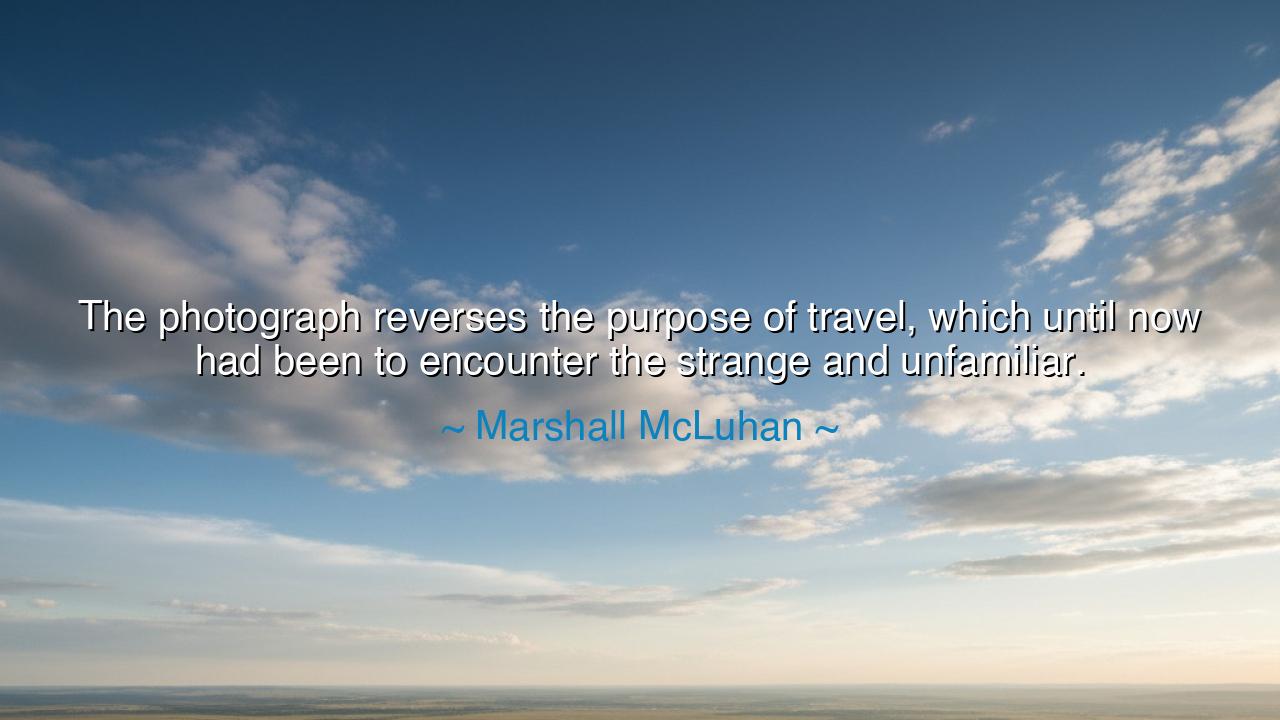
The photograph reverses the purpose of travel, which until now
The photograph reverses the purpose of travel, which until now had been to encounter the strange and unfamiliar.






When Marshall McLuhan declared, “The photograph reverses the purpose of travel, which until now had been to encounter the strange and unfamiliar,” he was unveiling a profound meditation on how technology reshapes the human spirit. His words pierce through the illusion that photographs are mere souvenirs. He teaches us that by capturing the world in images before we ever see it, we strip travel of its original wonder, transforming the strange into the already-known, the mysterious into the expected. Thus the photograph, in its silent power, alters not the land we walk upon, but the soul with which we walk upon it.
The meaning is this: once, to travel was to step into uncertainty, to meet faces, landscapes, and customs with no preparation but courage. The traveler went forth into the unknown, and in that encounter, was changed. But with the rise of the photograph, the world began to arrive before us. We see the Taj Mahal in a picture, the Eiffel Tower on a postcard, the jungles of the Amazon in magazines. By the time we set foot upon foreign soil, much of the strangeness has been dissolved, replaced by an image already formed in our minds. Thus, the photograph diminishes discovery, shaping expectation before experience.
History shows this transformation vividly. Consider the age of the great explorers—Marco Polo, who brought tales of China to a Europe that had never glimpsed such marvels, or Magellan, whose circumnavigation revealed lands unseen by Western eyes. Their journeys were filled with awe and terror, for they had no pictures to soften the unknown. Contrast this with the modern tourist, who arrives in Cairo already saturated with images of the pyramids, perhaps even disappointed that they look exactly as they did in the photograph. The photograph, meant to preserve wonder, has instead diminished it, robbing the heart of its surprise.
And yet, McLuhan does not condemn the photograph outright. He reveals its paradox: it brings the faraway near, but in so doing, it tames it. The power of the photograph lies in its ability to transport, to compress space and time into an image. But this very gift comes with a cost, for the more the world is brought to us, the less we must venture out to encounter it. The unfamiliar, which once stretched the soul, now risks being consumed passively from the comfort of home.
There is a warning here, too. If we rely too much on images, if we see the world only through the lens of others, we may cease to truly see it ourselves. The photograph can seduce us into believing we already know a place, when in truth, knowing requires presence, patience, and humility. To walk the streets, to smell the air, to hear the voices—these cannot be captured fully by any image. The traveler who confuses the photograph with the experience cheats himself of the deeper encounter.
So, dear listener, the lesson is this: do not let the image steal the soul of the journey. If you see a photograph of a place, let it be an invitation, not a substitute. Go beyond the picture, seek the textures, the silences, the strangeness that no camera can capture. Do not be content with what is familiar, for it is in the unfamiliar that the soul grows. Remember that the purpose of travel is not to confirm what you have already seen, but to discover what no photograph can prepare you for.
In practical action, this means: when you travel, resist the temptation to filter every moment through the lens of a camera. Allow yourself to be surprised, to enter spaces without expectation. Engage with people and places as living realities, not as backdrops to an image. And when you return, let your stories and memories be more than photographs—they should be encounters that have changed you, lessons carried into your life.
Thus McLuhan’s words stand as both warning and wisdom. “The photograph reverses the purpose of travel.” Let us not forget the original purpose: to step into the vast unknown, to embrace the strange, to encounter the unfamiliar with courage and humility. For it is only in this kind of travel that the human spirit is stretched to its fullest, and the world reveals itself as endlessly greater than any picture could contain.






AAdministratorAdministrator
Welcome, honored guests. Please leave a comment, we will respond soon